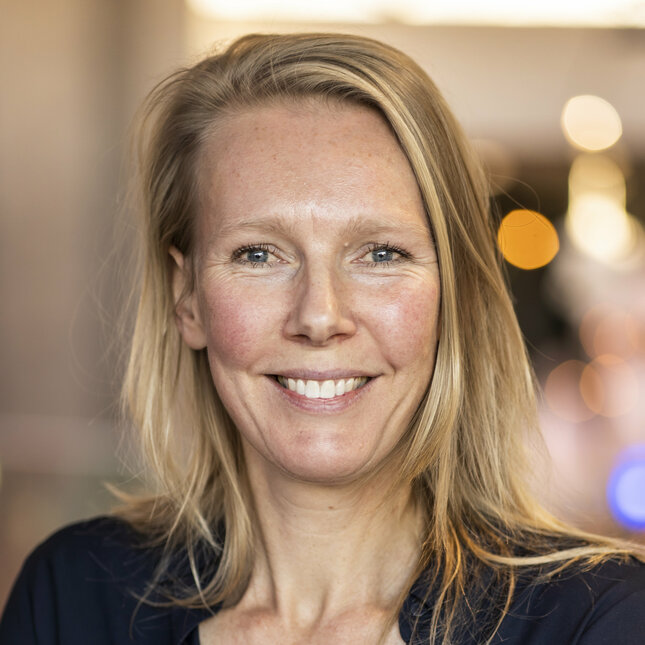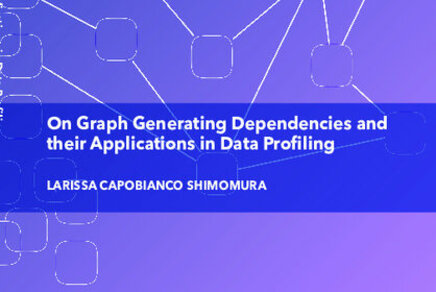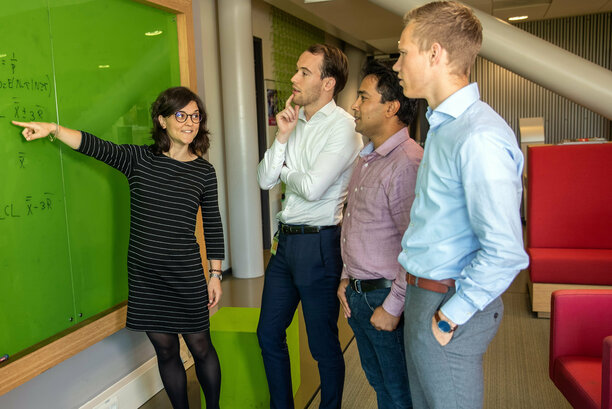We are looking for 25 new colleagues to complement our department, and we welcome applications in all areas of computer science, mathematics, data science, and artificial intelligence. Appointments can be at Assistant, Associate, or Full Professor level, depending on the seniority of your profile.
**THIS VACANCY IS NOW CLOSED**
M&CS Domains and Clusters
The Department of Mathematics and Computer Science is structured into three domains: Computer Science, Data Science & AI, and Mathematics. Each domain consists of several research clusters which bring together researchers working within the same subfield. Please scroll down for more information about the different research clusters.
-
Computer Science
Algorithms, Geometry & Applications
Formal System Analysis
Interconnected Resource-aware Intelligent Systems
Security
Software Engineering and Technology
-
Data Science & AI
Data and Artificial Intelligence
Process Analytics
Visualization
-
Mathematics
Center for Analysis, Scientific Computing and Applications
Statistics, Probability and Operations Research
Discrete Mathematics
COMPUTER SCIENCE
Algorithms, Geometry & Applications
The ALGA cluster (Algorithms, Geometry, and Applications) studies the design and analysis of algorithms and data structures, one of the core areas within computer science. Research in ALGA ranges from curiosity-driven to motivated by concrete applications, and from purely theoretical to experimental. In all cases, the goal is to understand the underlying principles of the developed solutions and to formally prove their properties. Our approaches frequently combine the rigorous methods from algorithmic theory – which give performance guarantees with respect to both the quality of solutions and the running time of algorithms – with efficient engineering to achieve results of both theoretical and practical significance.
Formal System Analysis
The FSA (Formal System Analysis) cluster focusses on theories, techniques and tools for modelling and analyzing the behavior of (concurrent) systems. Among others, we study the foundations and applications of process algebras, semantics, concurrency theory, model checking, logics, rewriting, and satisfiability solving. Application areas include, but are not limited to hardware designs, industrial control systems and smart mobility.
Read moreInterconnected Resource-aware Intelligent Systems
The research focus of the Interconnected Resource-aware Intelligent Systems (IRIS) cluster is on the design, analysis, development, and evaluation of concepts, models, algorithms, protocols, and tools that optimize (distributed embedded) systems performance in terms of timing behavior, dependability, programmability, reliability, robustness, scalability, accuracy, energy and data computation efficiency, and trustworthiness.
Read moreSecurity
The mission of the Security cluster (SEC) is to realize a more secure and privacy-preserving digital infrastructure. SEC’s approach to system security covers offensive and defensive aspects of system security, targeting concrete security problems and addressing the underlying, fundamental issues at their core.
Read moreSoftware Engineering and Technology
The objective of Software Engineering is to develop and maintain, in a time- and cost-efficient manner, high-quality software systems. In support of this, the Software Engineering and Technology (SET) cluster studies people, methods and tools for the development and maintenance of software. Research in SET includes curiosity-driven research, various types of empirical studies (in industry and experiments in labs), and also tool-building.
Read moreDATA SCIENCE
Data and Artificial Intelligence
At DAI we study foundations of AI for the present and the future. We design new AI methods, develop AI algorithms and tools with a view at expanding the reach of AI and its generalization abilities. In particular, we study foundational issues of robustness, safety, fairness, trust, reliability, tractability, scalability, interpretability and explain ability of AI. We actively collaborate with industry through multiple co-funded PhD projects. Each academic year DAI attracts 70+ excellent MSc students for their internships and final thesis projects, many of which are done in collaboration with industry and other departments.
Read moreProcess Analytics
One of the foundations of computer science today is data. Specifically in information systems, data – and the analytics developed on top of this data – have transformed the field from expert-driven to evidence-based, which in turn massively broadens the applicability of results to more and larger contexts. The Process Analytics cluster develops tools, techniques, and education for systematic extraction of insights into processes by analyzing models and event data stored in systems during the execution of said processes.
Read moreVisualization
The Visualization cluster focuses on the development of new methods and techniques to explore and present large data sets. The focus is on data visualization and visual analytics. We study how to provide insight in large, heterogeneous data sets, such as combinations of multivariate data, high dimensional data, sophisticated imaging data, network data, event data, and geospatial data, all often time varying.
Read moreMATHEMATICS
Center for Analysis, Scientific Computing and Applications
The research objective of CASA is to develop new and improve existing mathematical (both analytical and numerical) methods for a wide range of applications in science and engineering. Mathematics research within CASA is often driven by models from science and engineering, for instance by mathematical expressions of physical laws. Stimulated by the immense growth in the availability and use of data, mathematics in CASA is also becoming data- driven, with a crucial role in this for machine learning. There is enormous potential for the use of data and machine learning in analysis and scientific computing, in combination with the use of first-principles models. CASA will continue its longstanding expertise and success in, for instance, variational calculus, functional analysis, numerical methods for partial differential equations and linear algebra and model-order reduction methods, while extending its research into the direction of data science, machine learning and uncertainty quantification.
Statistics, Probability and Operations Research
The Statistics, Probability, and Operations Research (SPOR) cluster focuses on the development of foundational understanding and methodologies for the analysis and optimization of complex systems and large-scale networks. The development of sound mathematical models for highly complex systems plays a central role in the research activities within SPOR and serves as an enabler for the creation of effective techniques for inference, performance analysis and optimization of these systems, which are commonly subject to intrinsic randomness and uncertainty.
Read moreDiscrete Mathematics
Discrete Mathematics is concerned with finite structures and their properties. It is an exciting growth area in the modern information age. Just as continuous mathematics led to major scientific developments in the 19th and 20th century, Discrete Mathematics with its various subfields such as algebra, geometry, number theory, combinatorics, graph theory, discrete optimization, coding theory, cryptography, machine learning, computational algebra, information theory etc., underlies much of the developments in modern fields such as computer technology, communication networks and e-commerce.
CANDIDATE'S DAY
Part of our selection procedure is the Candidate’s Day, live on campus, where we will invite selected candidates to visit us in Eindhoven. We will organize several Candidate’s Days over the coming months. The Candidate’s Day is meant for you to get to know us, but also for us to learn more about you. You can (amongst other things) expect interviews, a campus tour or we might ask you for a mini lecture. More information about the specifics and how you can prepare for the Candidate’s Day will follow on this page soon.

Would you like more information? Our Senior Recruiter Hella Ploegmakers is happy to answer your questions.
E-mail: h.a.m.ploegmakers@tue.nl
Phone: +316 4355 9625
-
COMPENSATION AND BENEFITS
As an employee of TU/e you will fall under the collective agreement (CAO) for Dutch Universities, with the corresponding salary scales and secondary employment conditions. For example, you will receive an annual vacation allowance of 8% of your annual salary. You are also entitled to paid and unpaid parental leave and a pension scheme. Furthermore, TU/e offers its employees a year-end bonus of 8.3% of the annual salary and 41 days of vacation based on a full-time job. In most cases, it is possible to work (partially) from home.
Read more -
SUPPORT FOR INTERNATIONALS
TU/e is an international university, where one third of the academic staff consists of foreign staff. A special support team can help you with your transfer to the Netherlands. They can assist you with residence and labor permits, family reunion procedures and other practical matters. Additionally, TU/e promotes a healthy work-life balance and has many facilities to help you and your family feel right at home. For Professors (Assistant, Associate and Full), TU/e also offers a Partner Career Support Program.
Read more -
SCALE JUMP
The Brainport region is calling on TU/e to educate more engineers to facilitate the upscaling shift in industry. The ongoing growth in the Brainport region has to come to terms with enormous upscaling: thousands of vacancies need to be filled by 2030. There is a huge need for highly educated talent: ASML, for example, will grow by 15,000 additional employees in the coming years. What does this mean for our university?
Read more
Mathematics & Computer Science Highlights
Mathematics and Computer Science NEWS

![[Translate to English:]](https://assets.w3.tue.nl/w/fileadmin/_processed_/3/8/csm_Richard-Post_dc07c24bd7.jpg)

![[Translate to English:] [Translate to English:]](https://assets.w3.tue.nl/w/fileadmin/_processed_/3/6/csm_iStock-1422766384_c5282858ac.jpg)
![[Translate to English:]](https://assets.w3.tue.nl/w/fileadmin/_processed_/a/8/csm_whole_front_fb304d8977.jpg)
![[Translate to English:]](https://assets.w3.tue.nl/w/fileadmin/_processed_/1/f/csm_15518%20Sachin%20Bhardwaj-cover_2dfdec45e4.jpg)
All vacancies at the Department of Mathematics and Computer Science
-
Assistant Professor In Geometric Learning and Image Analysis
Assistant ProfessorMathematics and Computer ScienceWe have an excellent opportunity for an applied and industrially oriented mathematician! You will be working at the forefront of Geometric Learning and Image Analysis in the unique and inspiring Eindhoven Brainport region. This vacancy is part of the Irène Curie Fellowship and is currently only…
-
Postdoc Quantum Error Correction and Quantum Graph Theory
(Post-doctoral) ResearcherMathematics and Computer ScienceResearch on quantum technologies is set to revolutionize several aspects of our life, including how we process information. In the Department of Mathematics and Computer Science at Eindhoven University of Technology (TU/e), the Netherlands, there is a vacancy for a 2 year postdoctoral position on…
-
Lecturer
Other academic staffMathematics and Computer ScienceWould you like to nurture, inspire, and educate the next generation of software engineers? Eindhoven University of Technology (TU/e) is looking for a lecturer in the department of Mathematics and Computer Science focusing on one or more of the following software engineering education topics:…
